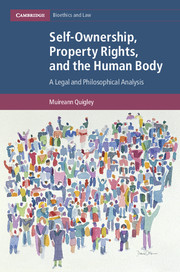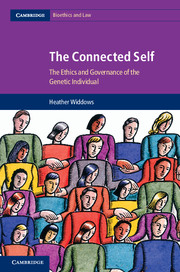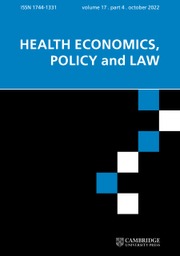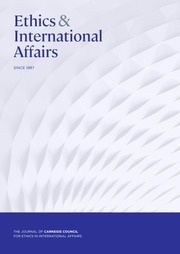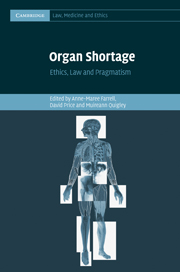Self-Ownership, Property Rights, and the Human Body
A Legal and Philosophical Analysis
Part of Cambridge Bioethics and Law
- Author: Muireann Quigley, University of Birmingham
- Date Published: April 2018
- availability: This ISBN is for an eBook version which is distributed on our behalf by a third party.
- format: Adobe eBook Reader
- isbn: 9781108651684
Find out more about Cambridge eBooks
Adobe eBook Reader
Other available formats:
Paperback, Hardback
Looking for an inspection copy?
This title is not currently available on inspection
-
How ought the law to deal with novel challenges regarding the use and control of human biomaterials? As it stands the law is ill-equipped to deal with these. Quigley argues that advancing biotechnology means that the law must confront and move boundaries which it has constructed; in particular, those which delineate property from non-property in relation to biomaterials. Drawing together often disparate strands of property discourse, she offers a philosophical and legal re-analysis of the law in relation to property in the body and biomaterials. She advances a new defence, underpinned by self-ownership, of the position that persons ought to be seen as the prima facie holders of property rights in their separated biomaterials. This book will appeal to those interested in medical and property law, philosophy, bioethics, and health policy amongst others.
Read more- Includes a robust discussion of self-ownership and provides a new perspective to the legal literature
- Brings together legal and philosophical scholarship in the area and enriches the discourse by taking a wider and more integrated view
- Discusses in-depth the legislative and common law background by covering a number of jurisdictions: England and Wales, Scotland, US, Canada and Australia
Awards
- Winner, 2018 Choice Outstanding Academic Title
Reviews & endorsements
'In sum, Quigley's book is a feat of thorough and innovative legal and philosophical argument on a highly topical issue. It is dense and technical without being tedious. Reading it is an immensely rewarding endeavour.' Barbara Prainsack, Medical Law Review
Customer reviews
Not yet reviewed
Be the first to review
Review was not posted due to profanity
×Product details
- Date Published: April 2018
- format: Adobe eBook Reader
- isbn: 9781108651684
- availability: This ISBN is for an eBook version which is distributed on our behalf by a third party.
Table of Contents
1. Bodies of value
Part I. Human Tissues and the Law:
2. Regulating the uses of biomaterials: consent and authorisation
3. Property in the body?
4. A property (r)evolution?
Part II. Property and Persons:
5. What is property? I: bundles and things
6. What is property? II: rights and interests
7. The scope and bounds of self-ownership
Part III. Beyond Self-Ownership:
8. Property rights in biomaterials
9. Transferring bodily property
10. The future of human biomaterials?
Sorry, this resource is locked
Please register or sign in to request access. If you are having problems accessing these resources please email [email protected]
Register Sign in» Proceed
You are now leaving the Cambridge University Press website. Your eBook purchase and download will be completed by our partner www.ebooks.com. Please see the permission section of the www.ebooks.com catalogue page for details of the print & copy limits on our eBooks.
Continue ×Are you sure you want to delete your account?
This cannot be undone.
Thank you for your feedback which will help us improve our service.
If you requested a response, we will make sure to get back to you shortly.
×
